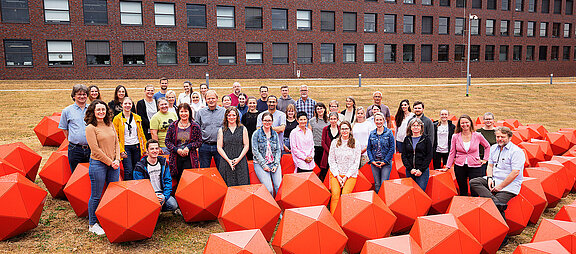The Institute of Molecular Virology and Cell Biology (IMVZ) was called until February 28, 2014 as "Institute of Molecular Biology (IMB).
Research on viral infection strategies is an important precondition for a thorough understanding of pathogens, the risks emanating from them, and their targeted control. Particularly the elucidation of the molecular basis of virus replication in the host cell is a special challenge and is essential for answering questions on pathomechanisms, host adaptation and targeted virus attenuation.
Therefore, the Institute of Molecular Virology and Cell Biology investigates pathogen-host cell interactions on the molecular level using selected viruses which are of importance in veterinary medicine. For this purpose, research at the institute focuses on herpesviruses (pseudorabies virus, bovine herpesvirus 1, infectious laryngotracheitis virus, Koi herpesvirus), rhabdoviruses (rabies and rabies-related viruses), orthomyxoviruses (influenzavirus), paramyxoviruses (Newcastle disease virus) and the African swine fever virus belonging to the Asfarviridae. Using the most recent molecular virological, biochemical and cell biological techniques, their genome organization and regulation of gene expression are investigated and viral gene products are identified and characterized with regard to their function and interaction with host cell components.
In addition to genetic engineering methods for targeted modification of viral genomes (cloning of complete viral genomes as bacterial artificial chromosomes (BAC); reverse genetics of RNA viruses), the platforms for proteome analysis (2-D gel electrophoresis and mass spectrometry (MALDI-TOF/TOF)) and for “Live-Cell Imaging” (real-time high resolution visualization of virological cell biological processes) which are part of the institute play a central role. Combination of the various infection models with the techniques established at the institute leads to a deeper understanding of basic virus-host cell interactions especially with regard to pathogenesis and immune response, which is essential for the development of improved vaccines and diagnostic procedures.
In addition, the Institute of Molecular Virology and Cell Biology houses the National Reference Laboratories for Aujeszky's Disease, Rabies, and Infectious Laryngotracheitis. The NRL for Rabies also acts as WOAH Reference Laboratory for Rabies and as WHO Collaborating Centre for Rabies Surveillance and Research.


